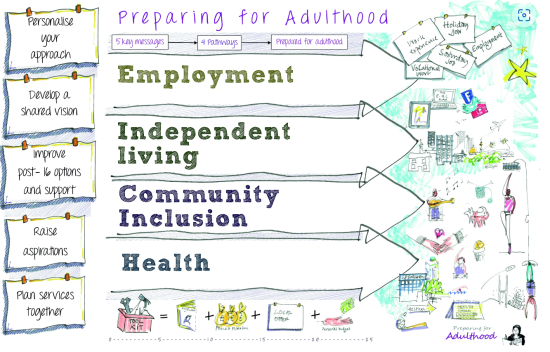Preparing for adulthood process
In this section you can find out about the support, information and advice about the post 16 process.

Preparing for Adulthood is a key element of the Special Educational Needs and Disabilities (SEND) reforms that aims to improve young people’s achievement of the four key life outcomes.
Download our Preparation for Adulthood Guide that shows you what should happen and when.
- Employment and further education
- Living independently
- The best health possible
- Having friends and relationships and being able to participate in the local community
The process starts in Year 9 (age 13 – 14) and can carry on until age 25, if necessary. Young people that have an Education Health and Care (EHC) Plan must have Preparing For Adulthood and Annual Reviews (councilfordisabledchildren.org.uk) and receive information, advice and support about their options and choices. All young people with an EHC Plan have an allocated Education, Health and Care Plan Co-ordinator.
The post 16 process includes the preparation and planning needed to support young people to move from school to further education choices such as sixth form or college and university. Depending on the needs of the young person, it may include the move from children’s social care and paediatric health services to adult social care and health services.
The SEND Code of Practice Chapter 8 highlights the need for this preparation to start early and centre on the young person’s own aspirations, interests and needs. The Department for Education Outcomes tool shows the preparing for adulthood outcomes across the age ranges for children and young people with SEND.
The Local Authority and the Clinical Commissioning Group have worked with and listened to parents, carers and young people and key partners across education, health and social care, employment and housing to develop a transition pathway that will support the achievement of key life outcomes.
This is our multi-agency transition planning process to support preparation for adulthood for young people with special Educational Needs and/or disabilities (SEND), complex physical or mental health needs, those with care needs, their parents/carers and young carers.
The pathway above is an overview to show how co-production, a strength based, outcomes focussed approach and timely key actions prepare young people for work and life as an independent adult.
To find more information and resources about what young people and their parents or carers can expect to happen as they go through this process have a look at the links below.
This information may also be of interest and use to parents and carers and young people that do not have do not have EHC Plans. They may have SEN Support Plans as they receive SEN support in school or college.
Young people age 16 years or above or their parents/carers can contact SENDIASS for independent information, support and advice at any point in the SEND process.
Preparing For Adulthood Guides and Toolkits (councilfordisabledchildren.org.uk)
William studies at Franklin College. Read his parents perspective of the support he received while he was there and his experience at the school.
“William was so happy at Franklin… and in his own words ‘at home’.”
“William always received outstanding and consistent help from the Learning Support team at Franklin College.
“He was made welcome well before he began by the Learning Support Manager at Franklin going along to his annual and transitional reviews whilst still at school. The Learning Support team got to know him on Transitional Days, reassuring him of any worries he had and so that he was confident to approach any one of them by the time he started.
“Throughout his time at Franklin the Support Manager and team were always thinking for William by looking at different ways to help him progress academically and as an individual.
“William was confident to move around the building alongside fellow students going to and from lessons enjoying the environment around him. He had access to 1:1 support within the classroom setting.
“This was always tailored to his specific needs but at the same time gently working towards giving him more confidence in his work. This in turn helped to increase his independence and ‘thinking for himself’ which he tends to struggle with. Support would point him in the right direction but yet gave him the freedom to work towards his goals blending in with his own method/way of working.
“William had access to additional support sessions with the same support assistant that had been present during his lessons. This helped enormously as they had been in the lesson together and so they could work on any aspect of the lesson that William was maybe struggling to understand or recapture. He was then able to continue his work at home independently without worry or anxiety.
“William enjoyed the support from someone close to his own age. He was like a ‘buddy’ to him, they would talk together on almost anything so he had support on a social and emotional basis. William also enjoyed extra-curricular activities that Franklin offered. This was an opportunity to be with other students and enjoy common interests together outside of lessons.
“William was part of an educational trip to Paris, it was the first time he had been out of the country from his family but once again, this was possible because of the un-ending support from Franklin staff. Even in his final weeks Franklin continued to support William by going along with him to visit where he was choosing to further his studies.
“William was so happy at Franklin he always felt self-assured there and in his own words ‘at home’. Everyone there was kind, patient and interested in him, taking the time to get to know him. For William his choice of going to Franklin was the right choice without doubt.
“And as his parents, we feel the very same too!”

You can directly text or email us your questions about preparing for adulthood.
Text: 07585 122306
Email: askannie@nelincs.gov.uk
